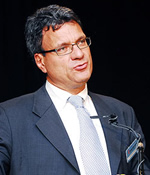Hope for the Future: Why the Atlanta Interfaith Manifesto is Important
 Growing up Methodist, a tiny minority religious community in overwhelmingly Lutheran/Roman Catholic Germany, left me with a strong desire for greater interaction and understanding among religious groups. This feeling was deepened through learning and remembering of the Holocaust and what my forebears had done primarily to Jews, but also to other minorities like homosexuals or Roma and Sinti. I found opportunities to engage in interfaith dialogue as I discovered on the global level The United Methodist Church, a communion of over 12 million people of faith worldwide, is often called upon to promote multi-faith advocacy and action.
Growing up Methodist, a tiny minority religious community in overwhelmingly Lutheran/Roman Catholic Germany, left me with a strong desire for greater interaction and understanding among religious groups. This feeling was deepened through learning and remembering of the Holocaust and what my forebears had done primarily to Jews, but also to other minorities like homosexuals or Roma and Sinti. I found opportunities to engage in interfaith dialogue as I discovered on the global level The United Methodist Church, a communion of over 12 million people of faith worldwide, is often called upon to promote multi-faith advocacy and action.
No experience so solidified my commitment to strong interfaith collaboration as what happened on June 28, 2016, when I was suddenly awakened from a nap in the transit lounge of the international airport in Istanbul, Turkey, by terrorists’ bombs. They killed more than 40 people and injured some 240 others. We ran this way and that, Christians, Muslims, and devotees of other faith, all focused on survival and all sharing a deep desire to get home, to be with our loved ones.
None of us knew what was happening; we knew we were threatened; we knew we needed a way out. As I sought shelter in a kitchen closet with an Asian man with whom I could communicate only with frightened eyes, I knew in a flash that until all faiths and cultures stand together against hate and violence, the world is doomed. It was a moment of solidarity with all people who face uncertain futures—and that is all of us. I felt this common humanity among us, a desire to reach out and take one another’s hands, to change the patterns of violence and xenophobia that plague our world.
This awareness was confirmed as we gathered for evacuation and I spoke with a family returning to Somalia, another going home to Egypt from a trip to Europe, and a young local woman caught in the melee without a passport while seeing off a friend. There was a sense of oneness in the bus that took us to a local hotel.
The Istanbul experience became part of my personal narrative as I, the head of a large international organization, had the opportunity to tell my story to the press and to various live audiences. The importance of interfaith collaboration also became more self-consciously a part of my professional agenda, linked to my organization’s goal of promoting justice, peace, and freedom.
Not long after this experience in Turkey, the agency that I lead, the United Methodist General Board of Global Ministries, moved from New York City to Atlanta where I learned of the Atlanta Interfaith Manifesto. I took the opportunity to join the cause it represents and to contribute to this blog. Given its leadership in civil rights, building on the deep legacy of Dr. Martin Luther King, Jr., Atlanta is a fitting place for the Manifesto, which calls for interfaith cooperation and a reduction of religious bigotry in the state, nation, and world. I am impressed by the number of people of many religious traditions who have signed the Manifesto and I plan to share that opportunity with colleagues and friends.
If people of faith and their leaders do not stand together in affirming a common humanity, there is no hope for the future. We must lead the way.
– Thomas Kemper, General Secretary, Global Ministries United Methodist Church
